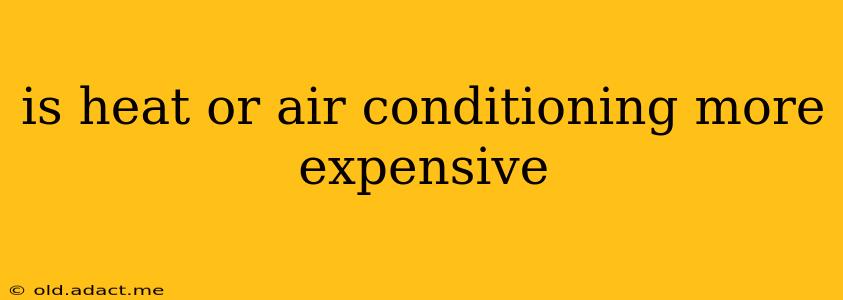The question of whether heating or cooling is more expensive is a common one, and the answer isn't a simple "yes" or "no." The actual cost depends on several interconnected factors, making a definitive statement impossible without considering your specific circumstances. This article will delve into the intricacies of heating and cooling costs, helping you understand the variables involved and enabling you to estimate which will likely be more expensive for you.
What Factors Determine Heating vs. Cooling Costs?
Several factors influence the relative expense of heating and cooling your home:
-
Climate: This is the most significant factor. In regions with long, cold winters and short, mild summers, heating will undoubtedly be more expensive. Conversely, in areas with hot, humid summers and mild winters, cooling costs will dominate. Consider the number of heating degree days (HDD) and cooling degree days (CDD) in your specific location. These metrics quantify the heating and cooling needs based on temperature differences from a baseline.
-
Home Insulation and Efficiency: A well-insulated home will significantly reduce both heating and cooling costs. Proper sealing, efficient windows, and adequate insulation in walls and attics are crucial for minimizing energy loss. Older homes, typically less efficient, will experience higher costs regardless of the season.
-
Heating and Cooling System Efficiency: The efficiency of your HVAC (Heating, Ventilation, and Air Conditioning) system plays a vital role. Look for systems with high SEER (Seasonal Energy Efficiency Ratio) ratings for air conditioners and AFUE (Annual Fuel Utilization Efficiency) ratings for furnaces. Higher ratings indicate greater efficiency and lower operating costs.
-
System Size and Type: An oversized heating or cooling system will cycle on and off frequently, leading to increased wear and tear and higher energy consumption. Conversely, an undersized system will struggle to maintain comfortable temperatures, resulting in higher energy bills. The type of system (e.g., heat pump, gas furnace, electric furnace) also affects efficiency and cost.
-
Energy Prices: Fluctuations in electricity and natural gas prices directly impact heating and cooling expenses. These prices vary regionally and seasonally.
-
Home Size and Layout: Larger homes naturally require more energy to heat and cool. The layout also plays a role; a poorly designed home with significant heat loss through windows or drafts will be more costly to maintain a comfortable temperature.
-
Usage Habits: Your personal preferences regarding thermostat settings heavily influence energy consumption. Lowering the thermostat in winter and raising it in summer, even by a few degrees, can make a considerable difference.
How Much Does Heating Typically Cost?
The average annual cost of heating in the United States varies widely by region and home size. While providing a specific number would be misleading, it's safe to say that heating costs can range from a few hundred dollars to several thousand dollars annually. Gas furnaces are generally cheaper to operate than electric heat, but the initial installation cost may be higher.
How Much Does Air Conditioning Typically Cost?
Similar to heating, the average annual cost of air conditioning also varies significantly based on location, home size, and system efficiency. Again, a specific figure would be inaccurate, but expect costs ranging from several hundred to several thousand dollars yearly.
What is More Expensive to Run, Heat Pump or Furnace?
This question often arises, and the answer is nuanced. Heat pumps are generally more energy-efficient for heating and cooling than traditional furnaces, especially in milder climates. However, in extremely cold climates, heat pumps can become less efficient, and a furnace may be more economical for heating.
What are the Best Ways to Reduce Heating and Cooling Costs?
Several strategies can help lower your heating and cooling bills:
- Improve Home Insulation: Seal air leaks, add insulation in attics and walls, and upgrade to energy-efficient windows.
- Regular HVAC Maintenance: Schedule annual maintenance to ensure your system is operating at peak efficiency.
- Programmable Thermostat: Utilize a programmable thermostat to automatically adjust temperatures when you're away or asleep.
- Smart Thermostat: Consider a smart thermostat that learns your habits and optimizes energy usage.
- Use Fans Strategically: Ceiling fans can help circulate air and reduce the strain on your HVAC system.
- Shade Windows: Use curtains or blinds to block sunlight during the hottest parts of the day.
Ultimately, determining whether heating or cooling will be more expensive for your specific situation requires a careful consideration of all the factors mentioned above. Consulting with an energy auditor or HVAC professional can provide a more accurate and personalized assessment of your needs and potential cost savings.
